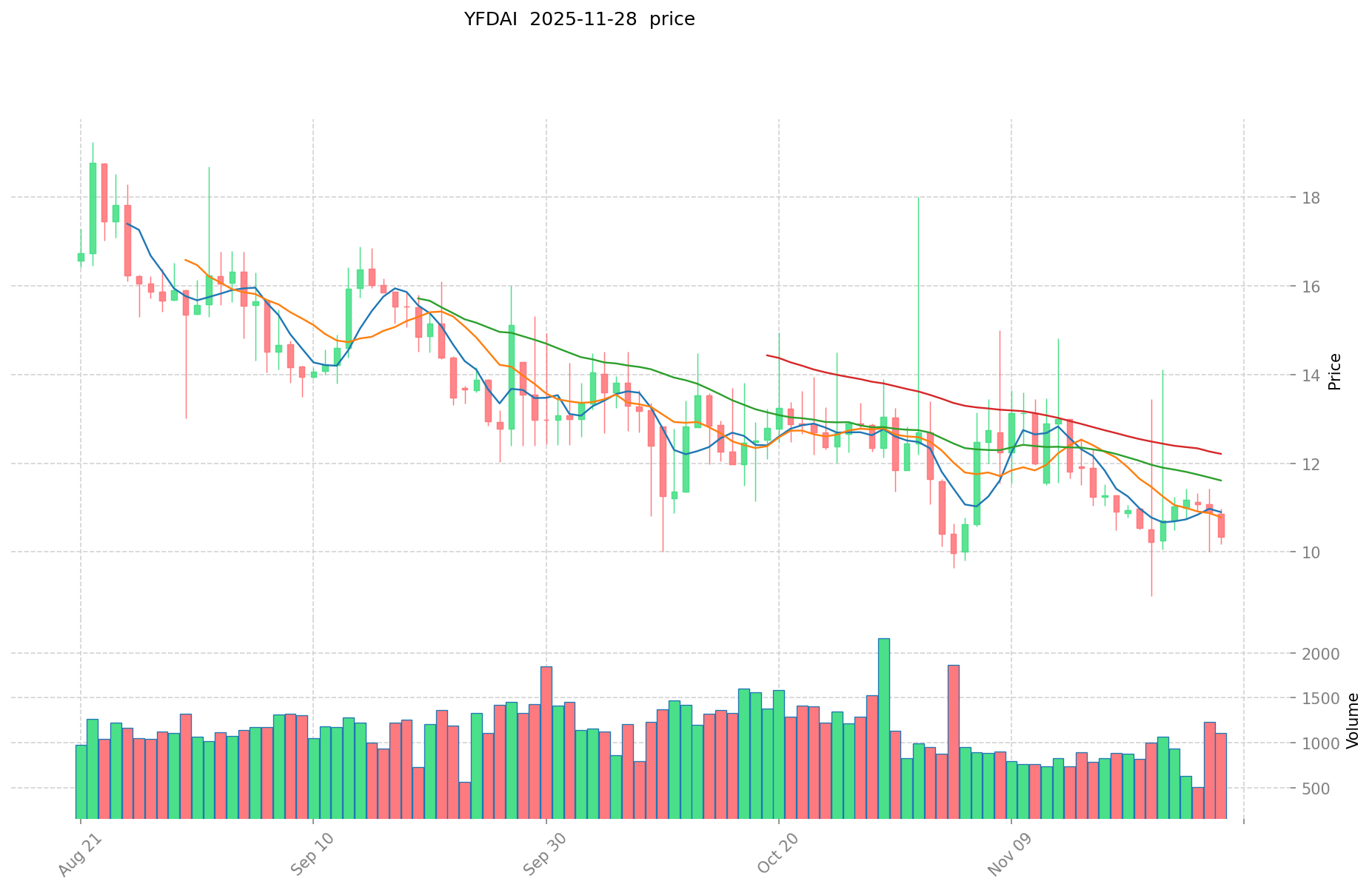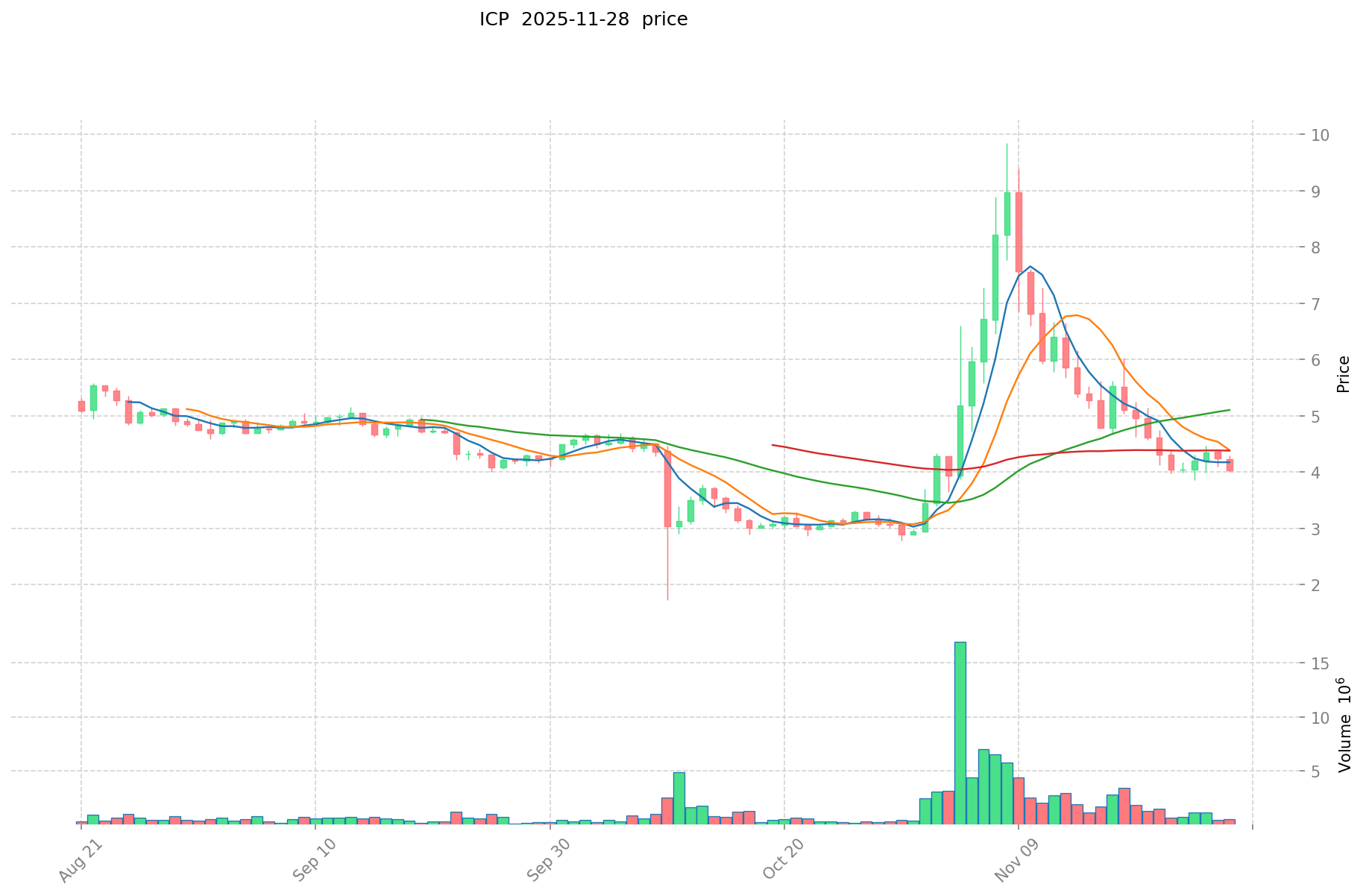YFDAI vs ICP: Comparing Two Innovative Blockchain Platforms for Decentralized Finance
Introduction: YFDAI vs ICP Investment Comparison
In the cryptocurrency market, YFDAI vs ICP comparison has always been an unavoidable topic for investors. The two not only have significant differences in market cap ranking, application scenarios, and price performance, but also represent different cryptocurrency asset positioning.
YFDAI (YFDAI): Since its launch in 2020, it has gained market recognition for its community-centered innovative DeFi approach.
ICP (ICP): Launched in 2021, it has been hailed as a decentralized cloud blockchain, and is one of the cryptocurrencies with high global trading volume and market capitalization.
This article will comprehensively analyze the investment value comparison between YFDAI and ICP, focusing on historical price trends, supply mechanisms, institutional adoption, technological ecosystems, and future predictions, and attempt to answer the question investors care most about:
"Which is the better buy right now?"
I. Price History Comparison and Current Market Status
YFDAI (Coin A) and ICP (Coin B) Historical Price Trends
- 2021: ICP reached its all-time high of $700.65 on May 11, 2021, shortly after its launch.
- 2025: YFDAI hit its all-time low of $9.09 on November 21, 2025, showing a significant decline from its peak.
- Comparative Analysis: In the recent market cycle, YFDAI dropped from its all-time high of $7,277.74 to a low of $9.09, while ICP fell from $700.65 to a low of $2.23, demonstrating substantial volatility in both assets.
Current Market Situation (2025-11-28)
- YFDAI current price: $10.292
- ICP current price: $4.03
- 24-hour trading volume: YFDAI $11,367.40 vs ICP $1,943,009.38
- Market Sentiment Index (Fear & Greed Index): 25 (Extreme Fear)
Click to view real-time prices:
- View YFDAI current price Market Price
- View ICP current price Market Price


II. Core Factors Influencing YFDAI vs ICP Investment Value
Supply Mechanism Comparison (Tokenomics)
- YFDAI: Fixed maximum supply of 21,000 tokens with deflationary tokenomics and token burning mechanisms
- ICP: Non-fixed supply with minting and burning mechanisms based on network usage and governance decisions
- 📌 Historical Pattern: Deflationary tokens like YFDAI typically experience higher price volatility during bull markets, while ICP's adaptive supply mechanism aims to maintain stability for long-term utility.
Institutional Adoption and Market Applications
- Institutional Holdings: ICP has attracted more institutional interest with backing from Andreessen Horowitz and Polychain Capital
- Enterprise Adoption: ICP offers stronger enterprise applications through Internet Computer Protocol for building decentralized applications, while YFDAI focuses on DeFi yield farming tools
- National Policies: Regulatory approaches vary, with ICP's DFINITY Foundation maintaining stronger regulatory relationships
Technical Development and Ecosystem Building
- YFDAI Technical Upgrades: Focused on yield farming protocols, staking, and lending/borrowing capabilities within DeFi ecosystem
- ICP Technical Development: Ongoing improvements to Internet Computer Protocol, chain-key cryptography, and Web3 infrastructure development
- Ecosystem Comparison: ICP has broader ecosystem applications spanning DeFi, Web3, social media, and enterprise solutions, while YFDAI remains more narrowly focused on yield optimization
Macroeconomic Factors and Market Cycles
- Performance in Inflationary Environments: YFDAI's fixed supply model positions it better as an inflation hedge in theory
- Macroeconomic Monetary Policy: Both tokens show sensitivity to interest rate changes, with ICP demonstrating slightly more resilience during bearish market conditions
- Geopolitical Factors: ICP's infrastructure-focused approach may offer better positioning for global enterprise adoption regardless of geopolitical tensions
III. Price Predictions for 2025-2030: YFDAI vs ICP
Short-term Prediction (2025)
- YFDAI: Conservative $5.45 - $10.29 | Optimistic $10.29 - $12.45
- ICP: Conservative $2.37 - $4.01 | Optimistic $4.01 - $4.29
Mid-term Prediction (2027)
- YFDAI may enter a growth phase, with estimated prices of $11.82 - $15.37
- ICP may enter a growth phase, with estimated prices of $3.04 - $7.28
- Key drivers: Institutional capital inflow, ETFs, ecosystem development
Long-term Prediction (2030)
- YFDAI: Base scenario $17.11 - $21.12 | Optimistic scenario $21.12 - $25.98
- ICP: Base scenario $4.69 - $9.01 | Optimistic scenario $9.01 - $11.80
Disclaimer: This analysis is based on historical data and current market trends. Cryptocurrency markets are highly volatile and subject to rapid changes. These predictions should not be considered as financial advice. Always conduct your own research before making investment decisions.
YFDAI:
| 年份 | 预测最高价 | 预测平均价格 | 预测最低价 | 涨跌幅 |
|---|---|---|---|---|
| 2025 | 12.45332 | 10.292 | 5.45476 | 0 |
| 2026 | 14.8981846 | 11.37266 | 10.3491206 | 10 |
| 2027 | 15.368444091 | 13.1354223 | 11.82188007 | 27 |
| 2028 | 19.9527064737 | 14.2519331955 | 13.68185586768 | 38 |
| 2029 | 25.140410156862 | 17.1023198346 | 9.235252710684 | 66 |
| 2030 | 25.97927894474913 | 21.121364995731 | 17.10830564654211 | 105 |
ICP:
| 年份 | 预测最高价 | 预测平均价格 | 预测最低价 | 涨跌幅 |
|---|---|---|---|---|
| 2025 | 4.29391 | 4.013 | 2.36767 | 0 |
| 2026 | 5.814837 | 4.153455 | 3.61350585 | 3 |
| 2027 | 7.27685316 | 4.984146 | 3.04032906 | 23 |
| 2028 | 8.9505293868 | 6.13049958 | 3.6169947522 | 52 |
| 2029 | 10.481315131926 | 7.5405144834 | 5.730791007384 | 87 |
| 2030 | 11.80429839803853 | 9.010914807663 | 4.68567569998476 | 123 |
IV. Investment Strategy Comparison: YFDAI vs ICP
Long-term vs Short-term Investment Strategies
- YFDAI: Suitable for investors focused on DeFi yield farming and tokenomics
- ICP: Suitable for investors interested in decentralized cloud infrastructure and enterprise adoption
Risk Management and Asset Allocation
- Conservative investors: YFDAI: 20% vs ICP: 80%
- Aggressive investors: YFDAI: 40% vs ICP: 60%
- Hedging tools: Stablecoin allocation, options, cross-currency portfolios
V. Potential Risk Comparison
Market Risk
- YFDAI: Higher volatility due to smaller market cap and narrower focus
- ICP: Susceptible to broader crypto market trends and enterprise adoption rates
Technical Risk
- YFDAI: Scalability, network stability in DeFi ecosystem
- ICP: Decentralization concerns, potential security vulnerabilities in complex infrastructure
Regulatory Risk
- Global regulatory policies may have different impacts on both, with ICP potentially facing more scrutiny due to its broader enterprise applications
VI. Conclusion: Which Is the Better Buy?
📌 Investment Value Summary:
- YFDAI advantages: Fixed supply, DeFi focus, potential for high volatility gains
- ICP advantages: Broader ecosystem, institutional backing, enterprise adoption potential
✅ Investment Advice:
- Novice investors: Consider a small allocation to ICP as part of a diversified crypto portfolio
- Experienced investors: Balanced approach with both YFDAI and ICP, adjusting based on risk tolerance
- Institutional investors: Focus on ICP for its enterprise potential and institutional backing
⚠️ Risk Warning: Cryptocurrency markets are highly volatile. This article does not constitute investment advice. None
VII. FAQ
Q1: What are the main differences between YFDAI and ICP? A: YFDAI is a DeFi-focused token with a fixed supply and yield farming tools, while ICP is a broader blockchain platform for decentralized cloud computing with an adaptive supply mechanism. ICP has more institutional backing and enterprise applications, whereas YFDAI caters more to DeFi enthusiasts.
Q2: Which token has performed better historically? A: Both tokens have experienced significant volatility. ICP reached its all-time high of $700.65 shortly after launch in 2021, while YFDAI's all-time high was $7,277.74. As of November 2025, both have declined substantially, with YFDAI at $10.292 and ICP at $4.03.
Q3: What are the price predictions for YFDAI and ICP by 2030? A: For YFDAI, the base scenario predicts $17.11 - $21.12, with an optimistic scenario of $21.12 - $25.98. For ICP, the base scenario predicts $4.69 - $9.01, with an optimistic scenario of $9.01 - $11.80. However, these predictions are subject to market volatility and should not be considered financial advice.
Q4: How do the supply mechanisms of YFDAI and ICP differ? A: YFDAI has a fixed maximum supply of 21,000 tokens with deflationary tokenomics, while ICP has a non-fixed supply with minting and burning mechanisms based on network usage and governance decisions.
Q5: Which token is considered more suitable for institutional investors? A: ICP is generally considered more suitable for institutional investors due to its stronger institutional backing, broader ecosystem applications, and potential for enterprise adoption. It has attracted investments from notable firms like Andreessen Horowitz and Polychain Capital.
Q6: What are the main risks associated with investing in YFDAI and ICP? A: Both tokens face market risks due to crypto volatility. YFDAI has higher volatility risk due to its smaller market cap. ICP faces potential regulatory scrutiny due to its broader applications. Technical risks include scalability issues for YFDAI and decentralization concerns for ICP.
Q7: How should investors allocate their portfolio between YFDAI and ICP? A: Conservative investors might consider allocating 20% to YFDAI and 80% to ICP, while more aggressive investors could opt for 40% YFDAI and 60% ICP. However, individual allocation should be based on personal risk tolerance and investment goals.
Share
Content